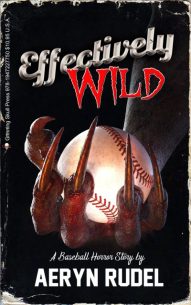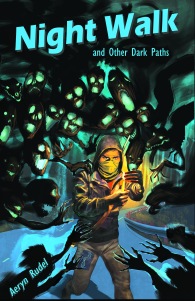Ranks of the Rejected: Richard Lee Byers
Posted on August 17, 2015 by Aeryn Rudel

This time on Ranks of the Rejected, I spoke with veteran fantasy and horror author Richard Lee Byers. I was lucky enough to work with Richard on a number of projects when I was acquisitions editor at Skull Island eXpeditions, and it was a great experience. He’s a true professional, astonishingly easy to work with, hits deadlines with laser-like precision, and turns in some of the cleanest first drafts I have ever seen. Richard was gracious enough to share some of his own tales of rejection, gathered over a long and successful career. Of course, Richard is more than just a well known and successful author. He is also a mighty 20th level Rejectomancer, whose reality-warping literary powers include Orson’s Instant Outline and Flawless First Draft.
Here’s a bit more about Richard:
Richard Lee Byers is the author of over forty fantasy and horror books including Blind God’s Bluff: A Billy Fox Novel (Night Shade Books), Murder in Corvis (Skull Island eXpeditions/Privateer Press), and the forthcoming “Black River Irregulars” trilogy (Skull Island eXpeditions/Privateer Press.) His short fiction appears in numerous anthologies, and he has collected some of the best of it in the eBooks The Q Word and Other Stories, Zombies in Paradise, and The Plague Knight and Other Stories. When the mood takes him, he writes an opinion column for the SF news site Airlock Alpha, and he invites everyone to connect with him on Facebook, Google+, Ello, and/or Twitter.
1) For many writers, that first rejection letter is pretty memorable. What do you remember about your first?
Honestly, I’ve been at this so long (since the mid-eighties) that I don’t remember the first. I can tell you my first novel was rejected by every genre publisher you’ve ever heard of and some you probably haven’t before finally being accepted by the most obscure market imaginable. I was overjoyed and accordingly crushed later when the novel came out and that publisher went bankrupt simultaneously. This meant nobody ever saw the book. Devastating for me, less so for the world, because when I looked at it again years later, it wasn’t a very good book. Anyway, right from the start, I had my nose rubbed in the randomness and bad luck that often afflicts a writing career, and the experience probably served me well. It may have kept me from being quite so crushed when other disappointments came along.
2) What do you hope to see in a rejection letter? What is useful to you as a writer?
Perhaps I’m arrogant, but there are only two things that strike me as useful to the writer. One is the editor saying that if I change X to Y, he would like to see the story again. The other is the editor encouraging me to send something else.
As far as criticism goes, I don’t pay much attention to it if the editor is definitely passing. This attitude stems from when I was shopping my first novel around. I mostly got personal rejection letters, and there was no consistency to the various editors’ reasons for turning down the book. This made me think that reworking a story on the basis of one editor’s reaction is foolish (unless, as I mentioned previously, he’s saying he’ll look at it again if I do.) Now, if ten editors made the same criticism, I might consider tinkering, but that hasn’t happened to me yet, and I wonder how often it happens to anyone.
3) Got a favorite rejection? Funny, mean, just straight-up weird?
One editor at a major house rejected a novel on the grounds that it was very much like a book they had recently published. I wasn’t familiar with that book, so I took a look at it. The story was nothing like mine. The title, however, was quite similar. As you can imagine, this left me wondering just how diligently the editor in question actually does his job.
4) What’s the toughest part of rejection for you? Pro tips for dealing with it?
Rejection hurts, no question. It feels like the editor is telling me something I poured my heart and soul into is no good and that I have no talent. That’s not a rational, useful way to look at the situation, and on a good day, I can shake off my initial reaction pretty quickly. Still, there’s often that gut-punch moment.
I have two tips for handling rejection. One is to already be working on another story when the rejection arrives. If you’re already focused on something new, the rejection of the old piece won’t sting as much, and if you’re going to have a professional writing career, you need to work steadily anyway.
The other tip is to get the rejected story back into submission immediately. Then it’s not a failure anymore. It’s a project that’s in play.
5) Tell us about your latest acceptance letter. How long did it take the sting out of the rejections that followed?
My most recent acceptance letter turned up in my email right before I started answering these questions, so no rejections have followed it yet. They undoubtedly will.
I can tell you that when a story finds a home, that obliterates any lingering pain from the rejections that preceded the acceptance. Fortunately, in recent years, most of mine find a home eventually, so I’m not too traumatized.
6) Okay, plug away. Tells us about your latest project or book and why we should run out and buy it.
You’ve caught me between novels. My last came out a while back, and the next, the first in my Black River Irregulars/Iron Kingdoms trilogy from Privateer Press, won’t be along for a while. But I have had stories in a number of anthologies that either came out recently or will be out in the near future. People who enjoy my sword-and-sorcery tales may want to check out Blackguards: Tales of Assassins, Mercenaries, and Rogues, The Bard’s Tale, and Champions of Aetaltis. Lovecraft fans may like my contributions to The Fall of Cthulhu, Cthulhu Fhtagn!, Resonator: New Lovecraftian Tales from Beyond, and Legacy of the Reanimator. People can get a taste of my non-Mythos horror in Blood Sushi and see how I handle science fantasy in a modern setting by reading my novelette “The Gold Bugs Affair.” Last but not least, I’ll have a story in License Expired: the Unauthorized James Bond. That book, however, will only be available in Canada and other places where the copyrights on the original Ian Fleming novels have expired, so interested parties living elsewhere (like in the US) may need to find a friendly Canadian to purchase it for them.
Rate this:
Related
Category: Ranks of the RejectedTags: authors, books, Freelance, rejection, Rejection Letters, Writing





